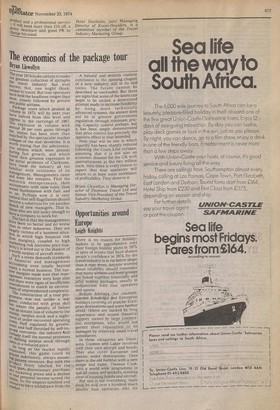The economics of the package tour Bryan Llewellyn
They 1974 looks certain to make the greatest collection of epitaphs the travel industry has ever known. Not, one might think, have to travel. But tour operators nave held the headlines longer than most, closely followed by private and public airlines.
Package tours which peaked i,n volume in 1973, will by next year have halved from this level and
The to the carryings of 1967. ine explosion in volume with annual 20 per cent gains through the 'sixties has been more than matched by the spectacular market Collapse of the mid-'seventies. It is ,,
worth noting that the administrative strains which were present during fast growth, and which Imind their greatest expression in have initial problems of Clarksons, `ia've made the industry all too larniliar with criticisms of its illanagement. Managements came and went like ninepins. First the maverick entrepreneurs, then accountants with slide rules, then Sound businessmen with flair, and s° on. Perhaps now it is only natural that self-flagellation should khecotne a substitute for yet another bunch of new managers. That is, ,ese who are still lucky enough to '-ve a company to work for. h The fact is that the managements thave been no better and no worse j""ait in other industries, They are , gelY victims of a business situar-ie° in which high financial risk .;_dr:IW margins), coupled to high iarketing risk (extreme price elas'city), is acted out in the shadow of a World surplus of aircraft seats. c-Stick a scene demands standards 24, financial and management --counting even totally beyond 1.1-lany a normal business. The narrow Margins made sure that managernent resources were kept slim and there were signs of insufficient nourishment to match an environment of unprecedented complexity. The construction of a tour pro Was not unlike a war t'`tr,.ie, conducted with great skill t4;‘ Where the penalty of failure e as an instant loss of volume to the tarkernY, surplus stock and a night, are, of under-recovered operating Half regulated by governin,r_ent and half throttled by self-imr'fsn,,d restraints, the industry ttill oade itself the normal processes s;, shifting surplus stock through 'les at a reduced price. ekAs icmg as the market rapidly reanded, this game could be ie4p,ed indefinitely, always assumpr° Patient investors. But with the thoonuct firmly labelled, for the st Part, discretionary purchase, rocketing prices and a decline tabrieal personal income turned the res esSo the empires tumbled and ourcesi,vere withdrawn from the Market.
A natural and entirely realistic conclusion to the opening chapter of a new industry still in its mid teens. The future cannot be described as unclouded. But there . are signs that some of the knots can begin to be untied, a determined attempt made to increase flexibility by using more technically advanced systems. An answer does . not lie in greater government regulation through minimum pricing. Capacity control perhaps, but it has been amply demonstrated that price control has precisely the opposite effect to that intended.
Next year will be one in which capacity has been sharply reduced following the Court Line collapse, assuming that it is not also an economic disaster for the UK with unemployment at the two million mark, then there is every reason to expect that tour operators will return to at least some semblance of profitability. They deserve it.
Bryan Llewellyn is Managing Director of Thomson Travel Ltd arid former Vice-President of the Travel Industry Marketing Group.


































 Previous page
Previous page